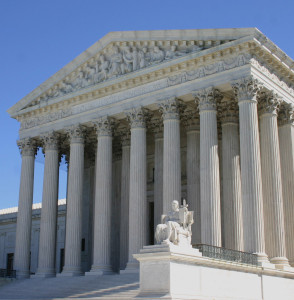In mid-March, the U.S. Court of Appeals for the Eighth Circuit, in National Parks Conservation Assoc., et al., v. McCarthy, approved the “Minnesota’s Regional Haze State Implementation  Plan” (MRHSIP), rejecting the arguments opposing EPA’s approval filed by several environmental organizations. The conservation organizations challenged EPA’s approval of Minnesota’s decision to use the Transport Rule—also known as the Cross-State Air Pollution Rule (CSAPR)—in place of source-specific best available retrofit technology (BART), and Minnesota’s reasonable-progress goals. They unsuccessfully claimed that “the Transport Rule allowances in the Plan are not ‘better than BART.'” Of note in this opinion is that, reviewing 42 U.S.C. § 7607(b), two of the three judges on the panel concluded that the Eighth Circuit has jurisdiction because the state implementation plans’ (SIP) reliance on the Transport Rule was based on local issues. If it was nationwide in scope and effect, this case would have to be heard by the DC Circuit Court of Appeals. With that, the Court of Appeals held that EPA’s approval of the Minnesota Plan based on the Transport Rule was not arbitrary and capricious and, similarly, EPA’s approval of the plan’s “reasonable-progress” goals was proper. The Court of Appeals noted, however, that other circuit courts have issued rulings that appear to conflict with its disposition.
Plan” (MRHSIP), rejecting the arguments opposing EPA’s approval filed by several environmental organizations. The conservation organizations challenged EPA’s approval of Minnesota’s decision to use the Transport Rule—also known as the Cross-State Air Pollution Rule (CSAPR)—in place of source-specific best available retrofit technology (BART), and Minnesota’s reasonable-progress goals. They unsuccessfully claimed that “the Transport Rule allowances in the Plan are not ‘better than BART.'” Of note in this opinion is that, reviewing 42 U.S.C. § 7607(b), two of the three judges on the panel concluded that the Eighth Circuit has jurisdiction because the state implementation plans’ (SIP) reliance on the Transport Rule was based on local issues. If it was nationwide in scope and effect, this case would have to be heard by the DC Circuit Court of Appeals. With that, the Court of Appeals held that EPA’s approval of the Minnesota Plan based on the Transport Rule was not arbitrary and capricious and, similarly, EPA’s approval of the plan’s “reasonable-progress” goals was proper. The Court of Appeals noted, however, that other circuit courts have issued rulings that appear to conflict with its disposition.
SCOTUS Rejects Interpretation of Law that Posed Serious Criminal Consequences
Earlier this week the U.S. Supreme Court, in Sturgeon v. Frost, Alaska Regional Director of the National Park Service, issued a unanimous ruling reversing the U.S. Court of Appeals for the Ninth Circuit’s interpretation of the Alaska National Interest Lands Conservations Act (ANILCA) that  had the effect of subjecting the use of hovercrafts on the Nation River in Alaska to criminal enforcement. The parties disputed whether Section 103(c) of ANILCA created an Alaska-specific exception to the National Park Service’s general authority over boating and related activities in federally managed preservation areas, each reaching different conclusions about the scope of the National Park Service’s powers. The Court rejected the interpretation adopted by the Ninth Circuit, noting that “[u]nder the reading of the statute adopted below, the Park Service may apply nationally applicable regulations to ‘non-public’ lands within the boundaries of conservation system units in Alaska, but it may not apply Alaska-specific regulations to those lands.” This is the second recent decision by the Court reversing a lower court’s ruling involving environmental regulations that could have had serious criminal consequences. The earlier ruling was Yates v. United States.
had the effect of subjecting the use of hovercrafts on the Nation River in Alaska to criminal enforcement. The parties disputed whether Section 103(c) of ANILCA created an Alaska-specific exception to the National Park Service’s general authority over boating and related activities in federally managed preservation areas, each reaching different conclusions about the scope of the National Park Service’s powers. The Court rejected the interpretation adopted by the Ninth Circuit, noting that “[u]nder the reading of the statute adopted below, the Park Service may apply nationally applicable regulations to ‘non-public’ lands within the boundaries of conservation system units in Alaska, but it may not apply Alaska-specific regulations to those lands.” This is the second recent decision by the Court reversing a lower court’s ruling involving environmental regulations that could have had serious criminal consequences. The earlier ruling was Yates v. United States.
10th Cir.: Time-Barred Claims Not Revived by Repeated and Continuing Violations Theories
In early March, the U.S. Court of Appeals for the Tenth Circuit, in Sierra Club v. Oklahoma Gas and Electric Company, in a 2-to-1 decision, affirmed the district court’s dismissal of Sierra Club’s  Clean Air Act (CAA) citizens suit against OG&E, concluding that their civil penalty and equitable relief claims are time-barred because Sierra Club’s claims first accrued when OG&E commenced modifications to the at-issue boiler without the required permit in March of 2008. Both parties agreed that civil penalties originating before April 1, 2008 were time-barred. The Court of Appeals rejected Sierra Club’s arguments to extend the limitations period to after April 1 premised on there being repeated and continuing violations because of the lack of the required permit. Sierra Club’s claims for declaratory and injunctive relief were also time-barred because they were based on the same facts and timeline. What difference a few days make!
Clean Air Act (CAA) citizens suit against OG&E, concluding that their civil penalty and equitable relief claims are time-barred because Sierra Club’s claims first accrued when OG&E commenced modifications to the at-issue boiler without the required permit in March of 2008. Both parties agreed that civil penalties originating before April 1, 2008 were time-barred. The Court of Appeals rejected Sierra Club’s arguments to extend the limitations period to after April 1 premised on there being repeated and continuing violations because of the lack of the required permit. Sierra Club’s claims for declaratory and injunctive relief were also time-barred because they were based on the same facts and timeline. What difference a few days make!
SCOTUS Expected To Resolve Circuit Split on Implied Certification Under FCA
In Supreme Court to Hear False Claims Act “Implied Certification” Appeal, we provide a primer for the oral argument that will be heard by the U.S. Supreme Court on April 19, 2016 in Universal Health Services  v. United States ex rel. Escobar, No. 15-7. The Court is expected to resolve the current split among federal appellate courts on the so-called “implied certification” theory of liability under the federal False Claims Act (FCA). The FCA imposes significant financial penalties for “knowingly present[ing], or caus[ing] to be presented, a false or fraudulent claim for payment or approval,” and prohibits contractors from making false statements “material to a false or fraudulent claim.” As many government contractors are well aware, the FCA has long been the Government’s favorite enforcement tool against federal contractors. Stay tuned for updates!
v. United States ex rel. Escobar, No. 15-7. The Court is expected to resolve the current split among federal appellate courts on the so-called “implied certification” theory of liability under the federal False Claims Act (FCA). The FCA imposes significant financial penalties for “knowingly present[ing], or caus[ing] to be presented, a false or fraudulent claim for payment or approval,” and prohibits contractors from making false statements “material to a false or fraudulent claim.” As many government contractors are well aware, the FCA has long been the Government’s favorite enforcement tool against federal contractors. Stay tuned for updates!
Additional Source: Schumer Alleges False “Made in America” Representations on GSA Website: False Claims Act Inquiry to Follow?
Photo: David, US Supreme Court, Taken Sept. 19, 2014 – Creative Commons
Placement on EPA’s NPL May Breathe New Life Into an NRD Claim
Properly interpreting CERCLA’s statute of limitations often presents vexing problems, and never more so than when claims for natural resource damages (NRD) are filed. As explained several years ago by the Ninth Circuit Court of Appeals in United States v. Asarco, Inc., ordinarily a claim for NRD must be filed within three years of the discovery of the loss and its connection with the release in question. However, a special provision creates an exception to this timeframe when the site is placed on EPA’s National Priority List (NPL). Such NRD claims must then be filed within three years of the completion of a remedial action for the site, a process that can take years if not decades. A case in point is the recently decided case of State of New York, et al., v. Next Millennium Realty, LLC, focusing on whether NRD claims that are otherwise time-barred can be revived if the site is later placed on EPA’s NPL.
A Patchwork of Plans Keep a Lizard Off the Endangered Species List
The courts have been busy issuing significant Endangered Species Act rulings. In the latest decision, the U.S. Court of Appeals for the District  of Columbia Circuit, in Defenders of Wildlife and Center for Biological Diversity v. Jewell, issued a unanimous ruling which affirmed the lower court’s decision that the U.S. Fish and Wildlife Service’s withdrawal of the proposed listing of the Dunes Sagebrush Lizard as an endangered species was consistent with the Endangered Species Act and the policies that the U.S. Fish and Wildlife Service has employed to administer the Act. This species is located in New Mexico and West Texas, where increasing oil and gas activity has threatened the habitat of the Lizard. The Court of Appeals held that a “voluntary state conservation agreement” can be considered by the U.S. Fish and Wildlife Service in deciding whether or not to list a species as endangered under the Act.
of Columbia Circuit, in Defenders of Wildlife and Center for Biological Diversity v. Jewell, issued a unanimous ruling which affirmed the lower court’s decision that the U.S. Fish and Wildlife Service’s withdrawal of the proposed listing of the Dunes Sagebrush Lizard as an endangered species was consistent with the Endangered Species Act and the policies that the U.S. Fish and Wildlife Service has employed to administer the Act. This species is located in New Mexico and West Texas, where increasing oil and gas activity has threatened the habitat of the Lizard. The Court of Appeals held that a “voluntary state conservation agreement” can be considered by the U.S. Fish and Wildlife Service in deciding whether or not to list a species as endangered under the Act.
SCOTUS: A REIT is a Citizen in Every State in Which a Shareholder is a Citizen
In REIT Citizenship and the Impact of Americold Realty Trust on Jurisdictional Challenges, we discuss the Supreme Court’s unanimously ruling in Americold Realty Trust v. ConAgra Foods, Inc. that unincorporated entities organized as “real estate investment trusts” (REITs) under Maryland law are citizens of every state in which at least one of their shareholders is a citizen. We predict that Justice Sonia Sotomayor’s holding, which appears broad enough to apply to any manner of statutory trusts or similar entities organized under various states’ laws, likely will steer more litigation where REITs and other unincorporated entities are parties into state courts—not federal courts.
Definition of “Solid Waste” in the RCRA Is Less Than Solid
EPA has spent almost 40 years wrestling with the definition of “solid waste” for purposes of the Resource Conservation and Recovery Act, 42 U.S.C. § 6901 et seq. (RCRA). The statutory definition of the term contemplates that it includes “any garbage, refuse, sludge from a waste treatment plant, water supply treatment plant, or air pollution control facility and other discarded material, including solid, liquid, semisolid, or contained gaseous material resulting from industrial, commercial, mining, and agricultural operations, and from community activities…” 42 U.S.C. § 6903(27). Whether something is discarded and thrown away is pretty clear. However, this statutory definition appears to give EPA the flexibility—and subject to EPA’s regulatory authority—to define solid waste to include materials that are sometimes discarded. Adding to the interpretive issues, a solid waste can be liquid or gaseous, depending on the statutory definition. EPA has also been wary of countenancing a recycling exception, which has created a morass of regulatory interpretation. With more frequency, courts are being called upon to consider this definition. Below we discuss two such recent court decisions of interest.
Insurer Stuck with Unfavorable Interpretation of Ambiguous Policy
In Fabozzi v. Lexington Insurance Company, the United States Court of Appeals for the Second Circuit has reaffirmed that ambiguities in an insurance policy must be construed against the insurer.
The Fabozzis were renovating their home when they learned that its interior walls were so rotted that the entire house was actually in the process of collapsing. Faced with the complete loss of their home, the Fabozzis understandably turned to their homeowners’ insurer, Lexington Insurance. The homeowners’ policy provided coverage for collapse caused by certain named perils, including hidden decay. But the policy also required that the collapse be “caused only by one or more of” the named perils. That simple, 7-word phrase led to Lexington’s denial of coverage and a decade of litigation.
A Resource Guide for Contractor Advertising on Social Media
In our post Contractor Advertising in the Age of Social Media, we promised you a by-no-means exhaustive resource for the various laws, regulations and guidance on social media “advertising” for contractors throughout the United States. The following list is a state-by-state resource to help one get started navigating the never-uniform and always changing contractor licensing-related laws, regulations, rules and licensing agency guidance for contractor advertising. This list does not include opinions issued by any courts and, obviously, these would relevant to your analysis as well and, like laws, regulations and regulatory agency guidance, new court decisions are issued changing the legal landscape over time. This blog also will not be regularly updated.




